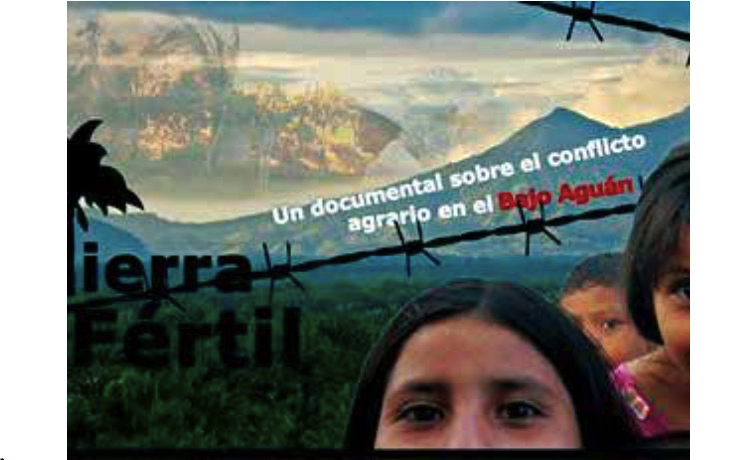. . SUSTAINABLE DEVELOPMENT . .
An article from a Mecate Corto, November 2013
“The reality changes very fast in Aguán,” it is said near the end of the documentary Fertile Ground, which in the time of two hours documents three years of fighting, losses and victories of the peasant movement for the reclaiming of stolen land in the Aguán Valley of Honduras.

Certainly, things change quickly. Too often, women and children say goodbye to their husbands and fathers at sunrise, and when they do not return at sunset, they realize that they have been killed. That’s part of the changing reality for thousands of landless peasants in Honduras, especially for farmers who three years ago began to claim the land that had been taken and monopolized by large landowners in the Lower Aguán Valley. The crisis has already claimed the lives of some 60 farmers.
“To show the world that there are human stories behind the numbers, that is what led me to make this documentary. A written report does not do justice to what is happening in Honduras especially with regard to occupation of the land”, says the director of the film, Jesse Freeston. Jesse has worked in journalism for many years and has covered the news in Honduras, but now he gives us a new genre about the reality hidden by the daily news.
“In Honduras there will never be peace if there is no land for the poorest,” says a peasant captured by the Freeston’s camera. And the causes are profound for the war that the taken the lives of thousands of Honduran men and women on a daily basis.
Freeston believes there is fertile land in Honduras, but much of it is owned by only a few rich families which makes the country one of the most unequal and violent in the world. We have to understand this, says Freeston, if we are to make changes in the reality of violence that is seen and discussed by the rest of the world.
“The documentary has the power to bring the audience to Aguán in order to hear what the people there have to teach us” says the filmmaker.
The documentary Fertile Ground was premiered in Honduras last month and tells the story of the Unified Peasant Movement of Aguan, Muca; and the repression suffered by the farmers living in communities on land that they had recovered from the landowner Miguel Facussé. In this case, the attacks came from the armed guards hired by Facussé, but in other cases this repression was at the hands of the armed forces of the State and of the National Police.
(The article is continued on the right side of this page)
(Click here for the original Spanish version of this article.)
(This article is continued from the left side of the page)
Freeston managed to capture the brutality with which the peasants and children were evicted again and again, even though he had to travel to many different places. He caught and shows the raw images of peasants who have been killed, the cry of women who not only lost their husbands, but often, their children as well, in spontaneous abortions.
The film shows the strength of women leaders as the “Queen” of the community, El Elixir, who, despite the ever present threats, continues to believe that another Honduras is possible for future generations to live in dignity.
The director also shows us scenes of the big businessmen and politicians who promote a development that does not help the majority of the population. He leads us to understand that what happens in the Aguán is part of a state policy that focuses on delivering the country to the highest bidders, both local entrepreneurs and foreign governments and transnational entrepreneurs.
However, Freeston also shows us the victories that the farmers have obtained despite the obstacles.
“All the people you see in this documentary are suffering, but they are also advancing. Their emotions are mixed: loss, joy and sadness. We see the Aguán not only as a reservoir of sadness but also of victories.”
Among the victories are those of the Salama Cooperative, the Cooperative Prieta and the San Esteban Cooperative, which represent models of friendly production at the level of peasant life, and which provide the kind of dignified life that the State has failed to promote.
Freestone shows how the reality of Aguan is linked to the 2009 Honduran coup d’etat which caused a rupture in Honduran history. In the film Fertile Ground we can see how the coup brings the people to the streets in resistance and leads to a great social movement. We see how it is linked to the land conflicts in Aguan where the peasants are inspired to struggle.
In Honduras, the agrarian reform of 1960 ended 30 years later with the Law on Agricultural Modernization in which thousands of farmers sold their land because they had no access to the means of production. In the Aguán valley, people like Miguel Facussé were the big winners of this government law, but three years ago the peasants rose up to claim the injustice that 100,000 of them work on land that no longer belongs to them.
“We are not fish that live in the sea, or birds that live in the air, we are human who must live off the land”, this phrase not only opens the film Fertile Ground as the peasant’s slogan, but is also the demand that we hear in the desperate cries for justice, like seeds in the earth for the dream of a better Honduras.